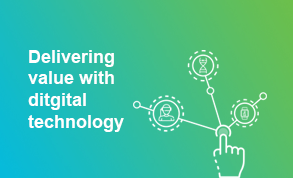Comment / Delivering value with digital
The NHS is having to address increasing demand in the context of financial constraints. The Topol review: preparing the healthcare workforce to deliver the digital future considers how digital healthcare, including digital medicine, genomics, artificial intelligence and robotics, can enable the NHS to meet this challenge.
These technologies can empower patients to participate actively in their care, with a greater focus on wellbeing and prevention. They also support the prediction of individual disease risk and personalise the management of long-term conditions.
 Digital transformation is not just the domain of clinicians and informatics. Finance staff also have a role to play. However, many finance staff may have little experience of what digital healthcare technologies are out there, or how they can support improvements in value and patient care.
Digital transformation is not just the domain of clinicians and informatics. Finance staff also have a role to play. However, many finance staff may have little experience of what digital healthcare technologies are out there, or how they can support improvements in value and patient care.
The fundamental starting point is for finance staff simply to find out more about digital healthcare technology. Digital healthcare will play a major role in the future delivery of services and finance professionals need to be immersed in the language and the potential that digital can offer.
There are specific challenges from a finance perspective. How do you make the case for investment? How do you articulate the benefits and what metrics do you use? How do we come up with solutions for potential financial barriers, for example around revenue and capital accounting, and future funding models?
The HFMA recently held a roundtable event to discuss these issues. Supported by Health Education England, the roundtable brought together finance leaders with clinicians and informatics specialists and covered a range of concerns and opportunities. The need for a common language helping all those involved in a programme to understand the quantitative and qualitative benefits was a key talking point, alongside the need for a much greater focus on benefits realisation – all too often overlooked once a project goes live.
Finance leaders also identified the need for more support on prioritisation. What do you fix first when there are legitimate arguments for multiple programmes? Or should you target the digital enthusiasts or the areas of greatest potential benefit, regardless of their digital readiness? (See Digital role.)
Digital healthcare offers exciting opportunities to enhance patient care and outcomes, while also improving efficiency. It offers the potential to deliver services in new ways, giving time back to clinicians, addressing long-standing shortages in some roles and unlocking huge amounts of information to improve decision making.
This is an area that the HFMA will be exploring further in the coming year and beyond. We want to hear from those who have already started their own local digital transformations and have a story to share with others. What do you think needs to happen to get other finance staff engaged with the agenda? We’d love to hear from you so get in touch and help shape our work.
Please email [email protected] with your thoughts and ideas.
This blog is part of the Delivering value with digital technologies programme that the HFMA is undertaking, supported by Health Education England. The programme aims to increase awareness amongst NHS finance staff about digital healthcare technologies, and enable finance to take an active role in supporting the use of digital technology to transform services and drive value and efficiency. For more information click here.
Related content
We are excited to bring you a fun packed Eastern Branch Conference in 2025 over three days.
This event is for those that will benefit from an overview of costing in the NHS or those new to costing and will cover why we cost and the processes.